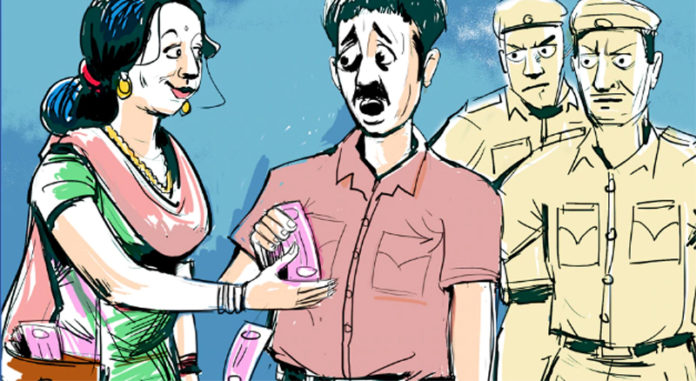After the infamous 2012 gang rape of a student on a bus in Delhi, the number of rape cases reported to police in India rose sharply. But one survey concluded that in Delhi, in 2013-14, more than half of these reports were “false” – fuelling claims by male activists that women are alleging rape in order to extort money from men.
Men’s rights activist Partha Sadhukhan takes a similar view.
“The reality at that point in time was that India had enough stringent laws to curb rape and punish the offenders,” he says.
“Today the definition of rape has changed so much and anything and everything is reported as rape.”
But are they right?
The evidence from the Commission for Women is in fact far from conclusive. It classes as “false” all reports of rape that were dropped before they reached court, without analysing the reasons why.
So it doesn’t distinguish between cases dropped because it was clear the woman was lying and those where a woman was put under pressure to withdraw her claim – or where there was simply insufficient evidence to build a strong case. Forensic evidence is rarely used in Indian rape cases, so it’s often just his word against hers.
One person who decided to do her own investigation was data journalist Rukmini Shrinivasan.
When she moved to Delhi from Mumbai to take up a post at The Hindu newspaper, she wanted to know whether Delhi’s reputation as the rape capital of India was justified.
Instead of counting dropped rape cases, she looked at the 460 cases that went to a full trial in Delhi district courts in 2013 and compared the initial complaint made to police with what happened in court.
Recently, a TV actor and singer Karan Oberoi was arrested for raping a woman under the pretext of marriage and filming the act and also threatening her for money; the case is in the court, two hearings are done and now third to continue in coming time. There are people who strongly believe that a woman has falsely implicated him and in spite of all the proofs, no justice is done to him. Well! Something strange is going on in India. Women are becoming more educated and confident. Pre-marital sex is on the rise – but at the same time, so are the numbers of women alleging rape on false promise of marriage. Much mention have been made mostly by men of false rape accusations and how frequently they occur. Falsely accusing a person of sexual assault is nearly as appalling as sexual assault itself. It inflicts psychic, familial, reputational and professional harms that can last a lifetime. This is nothing to scoff at.
 According to the National Crime Records Bureau, a total of 38,947 rape cases were reported in India in 2016. In 10,068 cases – about a quarter of the women claimed it was rape on false promise of marriage. In Andhra Pradesh, 45 per cent of all rape cases filed in the past two years fell into the false marriage category. In 2014, several newspapers of India have covered the data of Delhi Commission of Women (DCW), which states that 53.2 per cent of the rape cases in Delhi, filed between April 2013 and July 2014 were found to be ‘false’. When a relationship ends, women who have had consensual sex (sometimes flirtation but no sex), make false complaints of rape under the promise of marriage out of vengefulness, to hurt the man or they do it to extort money out of him, promising to withdraw the charge if he gives them what they want or just to damage a man, leaving no right to dignity for him. There can be any reason behind such cases but the one who gets convicted, loses almost everything. Perhaps that can be the motive too.
According to the National Crime Records Bureau, a total of 38,947 rape cases were reported in India in 2016. In 10,068 cases – about a quarter of the women claimed it was rape on false promise of marriage. In Andhra Pradesh, 45 per cent of all rape cases filed in the past two years fell into the false marriage category. In 2014, several newspapers of India have covered the data of Delhi Commission of Women (DCW), which states that 53.2 per cent of the rape cases in Delhi, filed between April 2013 and July 2014 were found to be ‘false’. When a relationship ends, women who have had consensual sex (sometimes flirtation but no sex), make false complaints of rape under the promise of marriage out of vengefulness, to hurt the man or they do it to extort money out of him, promising to withdraw the charge if he gives them what they want or just to damage a man, leaving no right to dignity for him. There can be any reason behind such cases but the one who gets convicted, loses almost everything. Perhaps that can be the motive too.
In many cases, false rape accusations are simply the result of parents covering up the “shame” of an unmarried daughter having sex. When parents discover their unmarried daughters are in a sexual relationship, their horror at potential “dishonour” to the family name leads many to make spurious allegations of rape, having first bullied their children into submission. By their logic, saying a daughter has been raped is preferable to people thinking she is sexually active. Time and again, it was the same story: the victim had been picked up in a moving car, given a drink laced with tranquilisers to render her oblivious, and raped. Or the guy got in relation, asked for nude pictures, filmed the act and dumped her for another prospect. You go to any police station or court or lawyer, you will find thousands of such similar cases. The recurrence of the sedative-laced drink seemed striking.
This allegation is important because it is necessary to show that consent was not given, to protect the girl’s character. But in this ugly spat, one forgets the reputation of a man, who is not as bad as projected. Same stories can be found in 75 out of 100 such cases. Only the names, dates and locations are different, otherwise they all narrate the story of sedatives and drinks when in fact the girls were in a relationship and willingly having sex.
They exchange gifts, have a merry time and do all that mutually, but when he moves on, he becomes rapist; if she moves on and the guy pursues, then too he becomes a stalker or rapist. In both the cases, the hammer is hit on the male’s head. These days, being in a relationship is a very serious crime; you never know what could be the outcome. Marriage and divorces have another stigma; 498A is used as a tool to extort what woman wants. Most of the divorce cases, the men are merely subjected to all sorts of cruelty. This is how our laws are, they are made to protect womanhood but the modern woman has made them an instrument to seek revenge. Visit any family court you will see those men who are actually shattered from all the sides, stand as losers but woman with vendetta pretends to be the innocent victim. Not all the cases are like this but yes, most of them are.
Men’s rights groups and some lawyers believe these false allegations of rape by women who have been in consensual relationships trivialize the seriousness of rape. They raise plenty of questions, too. Even if a man promised to marry a woman, can he not change his mind? How can judges determine a man’s sincerity or falsity in talking of marriage? Even more troubling is that the notion of sex constituting rape if a man “reneges” on a promise of marriage is not in the penal code. It has evolved on a case-by-case basis as a result of judges choosing to interpret the notion of “consent” in this fashion. As a consequence, men can be charged with rape if they falsely obtain consent for sex by promising to marry a woman and then changing their mind. The only solace for men who have been falsely accused is that many of these cases are thrown out of court. The Supreme Court ruling last month, for example, related to a nurse at a government hospital in Maharashtra. She was a widow who fell in love with a doctor and moved in with him. After living together for some years, he left her and married someone else. The judges said that having lived with the man for some years, the nurse could not allege rape. They pointed out that it was possible the doctor, on account of circumstances he could not have foreseen or could not control, was not able or willing to marry her. Whatever the reason, it was not rape. The doctor was acquitted. However, between the arrest and the acquittal lies much distress. I have come across many shattered men. Their trust in human relationships is destroyed. They withdraw into a shell, not knowing who they can trust and they are very frightened of embarking on another relationship. I have seen those men who lost faith in living life while languishing in jail for no reason, under trial cell is another harassment, you cannot imagine this hell until you land there. They die their death every moment, clueless of everything. This is the cruelest abuse before they actually get punished or acquittal.
In India, many men suffered trials being in Jail under the false. In 2014, 25,000 rape cases registered out of which 76 per cent were false. 30,000 molestation cases, but 75 per cent were FALSE. 1,00,000 DV/Dowry cases but 98 per cent were FALSE. Men jailed due to false Dowry cases are more than 11,00,000. Women (mother-in-law, sister-in-law) jailed due to false Dowry cases are more than 5,00,000. Senior citizens and children (below age of 15 years including boys and girls) jailed due to false Dowry cases are more than 2,00,000. Male suicides due to DV and DOWRY CASES are more than 85,000 every year. Male suicides due to FALSE Rape CASES are more than 10,000 every year. Male suicides due to false molestation cases are 3,500 every year. India reports maximum male suicides one man/8minutes compared to one woman/28 minutes. These figures are just in police records. Our society and media are very much focused on women harassment cases. What about when a man is harassed? How long are we going to be gender biased?




















































